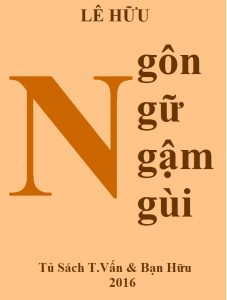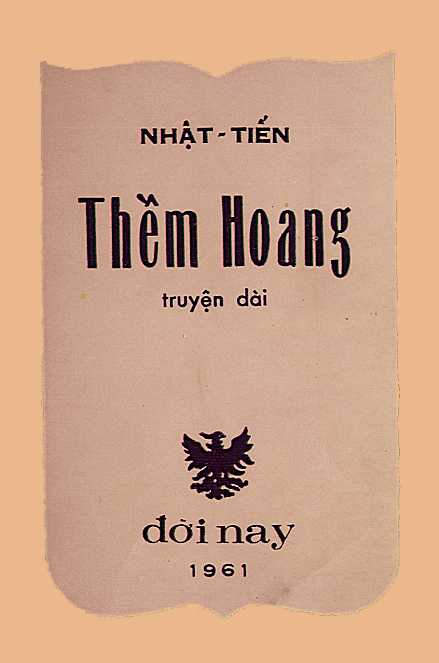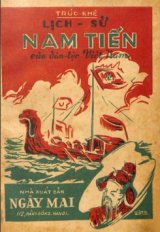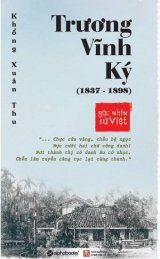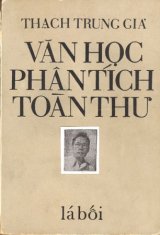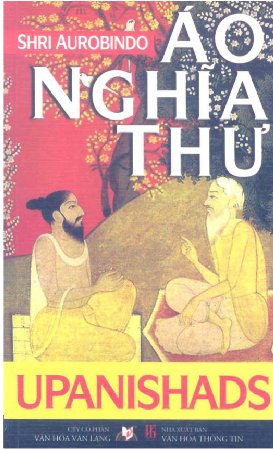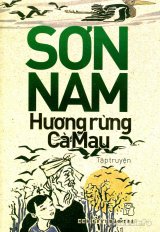|
|
|
|
|
VĂN HỌC |
GIAI THOẠI | TIỂU LUÂN | THƠ | TRUYỆN | THỜI LUẬN | NHÂN VẬT | ÂM NHẠC | HỘI HỌA | KHOA HỌC | GIẢI TRÍ | TIỂU SỬ |
-
Link Tác Phẩm và Tác Giả Tác Phẩm
Tác Giả
Thơ Văn Trần Yên Hoà & Bằng hữu
Tạp Chí
PHONG HÓA & NGÀY NAY
(Đại học Hoa Sen)
TỰ LỰC VĂN ĐOÀN, tác phẩm
(Viện Việt Học)
VĂN HỌC
Tạp chí Văn Học
DÒNG VIỆT
Trọn bộ DÒNG VIỆT
(1993-2009)
VĂN (Xuân Canh Thìn)
(vanmagazine)
TIỂU THUYẾT THỨ BẢY
NAM PHONG - TRI TÂN
THANH NGHỊ - NGÀY NAY
VĂN HOÁ NGÀY NAY
TẬP SAN SỬ ĐỊA
THẾ KỶ 21 - BÁCH KHOA
Tạp Chí VHNT Miền Nam
TÂN VĂN
TIN VĂN
Tạp chí ĐỌC VÀ VIẾT
THƯ QUÁN BẢN THẢO
Sách Xưa
• QUỐC VĂN GIÁO KHOA THƯ:
- Lớp Sơ Đẳng
- Lớp Đồng Ấu
- Lớp Dự Bị
• TỦ SÁCH TIẾNG VIỆT
• KHO SÁCH XƯA
• QUÁN VEN ĐƯỜNG
• LITTLE SAIGON
Phim và Hình Ảnh Xưa
- Cuộc Di Cư Năm 1954
- Phim "Chúng Tôi Muốn Sống"
- Phim "Nắng Chiều", 1973
- Phim Chân Trời Tím, 1971
- Hình ảnh xưa
eBooks
-
Dịch Thơ Hai Bà Trưng, Nguyễn Biểu, Trần Quang Khải với Chú Thích (Đàm Trung Pháp và Viên Linh) Ad-21 Ad-21 (Google - QC3) (Học Xá)
27-12-2011 | THƠ
Dịch Thơ Hai Bà Trưng, Nguyễn Biểu, Trần Quang Khải
ĐÀM TRUNG PHÁP và VIÊN LINH
Share File.php Share File




 The Trưng Sisters: VietNam's Revered Heroines
The Trưng Sisters: VietNam's Revered Heroines
 Scorning The Northern Enemy: Nguyễn Biểu's Satire Ăn Cỗ Đầu Người
Scorning The Northern Enemy: Nguyễn Biểu's Satire Ăn Cỗ Đầu Người
 Seized Spears at Chương Dương Ferry: Trần Quang Khải's Celebratory Poem of Epic Stature
Seized Spears at Chương Dương Ferry: Trần Quang Khải's Celebratory Poem of Epic Stature
:: The Trưng Sisters: VietNam's Revered Heroines
The two paragons of heroism Lady Trưng hailed from the Phong prefecture. Enraged hy a greedy tyrant and determined to avenge her husband, she and her younger sister, who shared a solemn oath, raised the lady-warrior flag asserting their command...

Hai Bà Trưng khởi nghĩa. Nét vẽ Lê Bá Đảng, Paris, 1952.
(Tài liệu của tạp chí Khởi Hành)
The popular verses above refer to Vietnam's revered heroines Trưng Trắc and Trưng Nhị. In the year 40, these two sisters recruited thousands of followers who helped them rout the greedy and cruel Chinese governor Su Ding (Tô Định), who had killed Trưng Trắc's husband Thi Sách. Su Ding's oowardly escape to China marked the end of Vietnam's first Chinese occupation, which had lasted 150 years [1]. Trưng Trắc became the reigning queen of Vietnam until the year 43, when she and her younger sister were defeated by the Chinese marshal Ma Yuan (Mã Viện) and subsequently killed themselves by jumping into a river. Since their deaths almost two thousand years ago, they have been reverently commemorated as the nation's paragons of heroism ơn their death anniversary (the sixth day of the second month of the lunar year). Shrines in their honor exist in many places, even in southem Guangdong (Quảng Đông) in China, but the two best-known ones are in Đồng Nhân village near Hà Nội and Hát Môn village in Sơn Tây province.
According to the book Lĩnh Nam Chích Quái (Wonders Plucked from the Dust of Lingnan) written in the fifteenth century, the Trưng sisters were born in Mê Linh village, Phong prefecture. Their father was a Lạc lord in Giao prefecture. Trưng Trắc was a strong and brave woman who was married to Thi Sách, a resident of Diên prefecture. When the egregious Chinese governor Su Ding killed Thi Sách, Trưng Trắc and her sister Trưng Nhị started an uprising against the Chinese occupation. Supported by the people of Cửu Chân, Nhật Nam, and Hợp Phố districts, the sisters pacified sixty-five strongholds throughout Lĩnh Nam [2]. As the country'snew sovereign, Queen Trưng Trắc set up her court in Mê Linh, abolished the insidious tribute taxes imposed by the Chinese, and restored a simpler form of government reflecting traditional Vietnamese values. Su Ding escaped to China and was dismissed by the Han court, which later dispatched Ma Yuan (Mã Viện) and Liu Long (Lưu Long), two seasoned generals, to Lĩnh Nam to reclaim it. The fighting lasted for more than a year in Lạng Sơn. Outnumbered by the much more adept enemy, the Trưng sisters and their troops had to retreat to Cấm Khê, where they were defeated. As their troops dispersed, our heroines killed themselves by drowning.
ln the thirteenth century, the historian Lê Văn Hưu [3] did not mince his words when he wrote about the heroic deeds of the Trưng sisters, as recorded in Đại Việt Sử Ký Toàn Thư (Complete Book of History of Great Viet) compiled by the historian Ngô Sĩ Liên [4] in the fifteenth century:
"Trưng Trắc and Trưng Nhị were women. They gave one shout and the Cửu Chân, Nhật Nam, and Hợp Phố districts, along with sixty-five strongholds, responded to them. Their setting up the nation and proclaiming themselves as queens was as easy as turning over their hands. This shows that our land was able to establish a royal tradition. Alas, for a thousand years after this uprising, the men of our land bowed their heads, folded their arms in servitude to the Chinese. How shameful this is in comparison with the Trưng sisters!"
THE GLORIOUS "WE ARE WE" LEGACY

The beheading Thi Sach by Su Ding (Illustrated by Le Ba Dang, Paris, 1952)
Reflecting on the astute thinking of the scholar Phạm Huy Thông [5] in his 1975 article on a new synthesis of Vietnamese history inspired by recent archeological discoveries, published in Học tập 21 (237), two highlights in which were that the destruction of the ancient Viet civilization by the Chinese victors after the Trưng sisters' short-lived era was a "death that did not become death," and that "though oppressed by a foreign country for a thousand years, the will that 'we are we' among our people was not something that could be shaken loose," Taylor (1983, p. 339) cogently summarized how contemporary Vietnamese evaluate the Trưng sisters:
"It implies that if the Trưng sisters had not resisted, there would be no Vietnamese nation today, that the uprising of A.D. 40 effectively 'froze' the Dong-son heritage [6] in a moment of historic courage, insuring that it would not degenerate and invite the scorn of later generations. The Trưng sisters were the last of the pre-Chinese popular leaders; their deeds echoed across the centuries of Chinese rule, calling the Vietnamese back to an ancient inheritance."
POETRY WRITTEN ABOUT THE HEROINES
Two poems written in honor of the Trưng sisters are translated and annotated below. The first one, translated by the scholar Huỳnh Sanh Thông (1996, p. 30}, is from the Hồng Đức Anthology compiled in the fifteenth century by the highly literary court of King Lê Thánh Tông. The second one is from the Đại Nam's National History Explained in Verse, a work by a group of poets that was revised by Lê Ngô Cát and Phạm Đình Toái in the nineteenth century, during the Nguyễn dynasty.
VỊNH HAI BÀ TRƯNG
Giúp dân dẹp loạn trả thù mình,
Chị rủ cùng em kết nghĩa binh.
Tô Định bay hồn vang một trận,
Lĩnh Nam mở cõi vững trăm thành.
Mới dày bảo vị gia ơn trọng,
Đã đội hoa quan xuống phúc lành.
Còn nước còn non còn miếu mạo,
Nữ trung đệ nhất đấng tài danh.
[Hồng Đức Quốc Âm Thi Tập]
HOMAGE TO THE TRƯNG QUEENS
To slay the people's foe and wreak revenge, two sisters took up arms for their just cause. One battle put Su Ding's scared wits to rout; a hundred tribes rose up to guard Lingnan. They climbed the throne - large bounties they bestowed. They donned their crowns - sweet blessings they conferred. While streams and hills endure, their shrineshall stand, a monument to peerless womanhood.
[Hồng Đức Anthology]
HAI BÀ TRƯNG DỰNG NỀN ĐỘC LẬP
Bà Trưng quê ở châu Phong
Giận người tham bạo thù chồng chẳng quên.
Chị em nặng một lời nguyền,
Phất cờ nương tử thay quyền tướng quân,
Ngàn Tây nổi áng phong trần,
Ầm ầm binh mã xuống gần Long Biên.
Hồng quần nhẹ bước chinh yên,
Đuổi ngay Tô Định dẹp tan biên thành.
Đô kỳ đóng cõi Mê Linh,
Lĩnh Nam riêng một triều đình nước ta.
Ba thu gánh vác sơn hà,
Một là báo phục, hai là bá vương.
Uy danh động đến Bắc phương,
Hán sai Mã Viện lên đường tiến công.
Hồ Tây đua sức vẫy vùng,
Nữ nhi chống với anh hùng được nao?
Cấm Khê đến lúc hiểm nghèo,
Chị em thất thế cũng liều với sông.
Phục Ba mới dựng cột đồng,
Ải quan truyền dấu biên công cõi ngoài.
Trưng Vương vắng mặt còn ai?
Đi về thay đổi mặc người Hán quan.
[Đại Nam Quốc Sử Diễn Ca]
THE TRƯNG SISTERS ESTABLISHED INDEPENDENCE
Lady Trưng hailed from the Phong prefecture. Enraged by a greedy tyrant and determined to avenge her husband, she and her younger sister, who shared a solemn oath, raised the lady-general flag asserting their command [7]. From the west surged wind and dust, troops and horses thundered toward Long Biên. On horseback, the ladies agilely deployed their soldiers, quickly routing Su Dinh and flattening his fortress. Mê Linh was to become their capital, and Lĩnh Nam was where they held their own court. For three years they served the country, having both taken vengeance and ascended the throne. Their heroic reputation reached the north causing the Han court to dispatch Ma Yuan to topple them. In Hồ Tây the two sides battled, but how could women match seasoned male warriors? Held at bay in Cấm Khê, the defeated sisters drowned themselves in a river. The Wave- Calming general [8] erected a bronze pillar [9] to mark the southern most border of his country. With Queen Trưng gone, who could be counted on? A Han mandarin would be free to rule the land.
[Đại Nam's National History Explained in Verse]
ANNOTATIONS
[l] Vietnam was under Chinese rule four times, totaling 1,007 years. The first time lasting 150 years (111 BC - 39 AD) was ended by Trưng Trắc. The second time lasting 501 years (43 - 544) was ended by Lý Bôn. The third time lasting 336 years (603 - 939) was ended by Ngô Quyền, and the fourth time lasting 20 years (1407 - 1427} was ended by Lê Lợi.
[2] Lĩnh Nam (Lingnan} literally means "south of the mountain range" and is an ancient Chinese name for the area thai covered China's Guangdong (Quảng Đông), Guangxi (Quảng Tây) and northern Vietnam.
[3] Lê Văn Hưu was Vietnam's first historian. At the request of King Trần Thái Tôn, he became the chief compiler of the 30-volume History of Great Viet (Đại Việt Sử Ký) which was completed in 1272.
[4] Ngô Sĩ Liên was asked by King Lê Thánh Tôn to compile the 15-volume Complete Book of History of Great Viet (Đại Việt Sử Ký Toàn Thư) which was completed in 1479.
[5] The French-educated archeologist Phạm Huy Thông (1916-1988) was also a noted poet and educator. He directed the lnstitute of Archeology in Hanoi from 1967 to 1988.
[6] The Đông Sơn culture flourished during the Bronze Age in Vietnam, when the first Vietnamese kingdoms named Văn Lang and Âu Lạc existed. Also known as Lạc Việt, the Đông Sơn people were good at growing rice, raising buffaloes and pigs, fishing, and sailing. They were also skilled bronze casters whose amazing works included the famous Đông Sơn and Ngọc Lũ drums.
[7] The image of two brave young women on top of elephants leading the troops and raising swords and flags of commandis such a sublime icon of heroism!
[8] Wave-Calming is the translation of the honorific title Fu Bo (Phục Ba) that was bestowed upon marshal Ma Yuan when he was dispatched to battle the Trưng sisters.
[9] Before Ma Yuan returned to China, he had a bronze pillar erected to mark the southernmost border of China. On the pillar was engraved this haughty warning: "If this pillar breaks, Giao Chỉ will perish." Giao Chỉ was the name of Vietnam at that time.
REFERENCES
- ĐỖ ĐỨC HIỂU (chủ biên, 2003). Từ điển văn học bộ mới. Hanoi: NXB Thế Giới.
- HOÀNG THÚC TRÂM (1941). Dâng hương Miếu Hát. Hanoi: Tri Tân.
- HOÀNG XUÂN HÃN (1956). Đại Nam quốc sử diễn ca. Saigon: Trường Thi.
- HUỲNH SANH THÔNG (1996). An anthology of Vietnamese poems. New Haven and London: Yale University Press.
- TAYLOR, KEITH WELLER (1983). The birth of Vietnam. Berkeley: University of California Press.
- TRẦN THẾ PHÁP (Lê Hữu Mục dịch, 1982). Lĩnh Nam chích quái. Hoa Kỳ: NXB Trăm Việt.
- TRẦN TRỌNG KIM (1953). Việt Nam sử lược. Saigon: NXB Tân Việt.
Đàm Trung Pháp & Viên Linh
(trích từ Khởi Hành số 185, tháng 3.2012)
Ad-22-A_Newest-Feb25-2022 Ad-22-A_Newest-Feb25-2022
:: Scorning The Northern Enemy: Nguyễn Biểu's Satire Ăn Cỗ Đầu Người

Nguyễn Biểu
Tranh minh họa
Nguyễn Biểu (1350-1413) was a brave righteous man who was born in Hà Tĩnh Province during the wane of the Trần dynasty. He was a ngự sử (a mandarin whose duty was to prevent the king from making wrong decisions) when Hồ Quý Ly was usurping the throne and the Ming (Minh) troops from China were invading Vietnam under the guise of defeating the usurper and restoring the Trần dynasty. Nguyễn Biểu decided to join King Trần Trùng Quang to defeat the invaders.
In early 1413, after the loss of Nghệ An, the king retreated to Hóa Châu. To buy time, the king asked Nguyễn Biểu to negotiate for peace with the Ming general Zhang Fu (Trương Phụ). After the meeting, however, Zhang Fu did not allow Nguyễn Biểu to leave. Infuriated, Nguyễn Biểu said to Zhang Fu and his subordinates: "You brutes, you only pretend that out of love and righteousness you have brought your troops to aid the Trần dynasty, but you are actually invading my country and robbing and oppressing my innocent people. You are truly a bunch of atrocious robbers" (Nguyễn Huyền Anh 1990, page 217). Stunned by the daring denunciation, tbe wicked Zhang Fu wanted to ascertain Nguyễn Biểu's fearlessness by serving him a meal of human head, with the promise that after he finished it, he would be set free[1] .
Without batting an eye, Nguyễn Biểu sat down, gouged the eyes from the human head and put them in his mouth while reciting a poem whose wit and sarcasm scorned the enemy from the North [2]. This eight-line sonnet titled Ăn cỗ đầu người (Enjoying a human-head feast) appears below with its translation into English:
Ăn Cỗ Đầu Người
Ngọc thiện trân tu đã đủ mùi,
Gia hào thêm có cỗ đầu người.
Nem cuông (công), chả phượng còn thua béo,
Thịt gụ (gấu), gan lân hẳn kém tươi.
Ca lối lộc minh so cũng một,
Vật bày thỏ thủ bội gấp mười.
Kìa kìa ngon ngọt tày vai lợn,
Tráng sĩ như Phàn tiếng để đời.
Nguyễn Biểu
I have savored enough precious delicacies,
My gastronomy now adds the human-head feast.
Richer than even peacock sausage and phoenix roll,
Bear meat, unicorn liver hardly compare in freshness.
The belling-deer style song is on the same par [3],
The object displayed on the rabbit head is ten times more. [4]
Hey, hey, it is as delicious as a pork shoulder [5]
Brave men like Phàn enjoy eternal fame. [6]
Zhang Fu swallowed his pride and released Nguyễn Biểu when the macabre meal was finished. But later, urged by his subordinates and the sycophantic surrendered Vietnamese generals, Zhang Fu had the fearless Nguyễn Biểu captured and tied to a post of a bridge. He drowned when the tide rose.
King Trần Trùng Quang bestowed upon Nguyễn Biểu the posthumous title of Nghĩa Vương (Prince of Righteousness).
ANNOTATIONS
[l] This fearless spirit was also displayed by general Trần Bình Trọng in 1285, when he was captured by the invading Yuan (Nguyên) troops commanded by Togan (Thoát Hoan). To no avail, Togan urged this valiant general to surrender, with promise of copious rewards. Finally, the captured general was asked if he would consider a royal title in the North, whereupon he shouted, "I would rather be a devil in the South than a king in the North" (Trần Trọng Kim 1971, page 144). Togan had him beheaded.
[2] This satire is a regulated poem (luật thi) observing the strict rules of Tang prosody (Đường luât). These rules were a touchstone for literati's versificatory expertise. Like other Vietnamese poets of the old days, the erudite Nguyễn Biểu made use of literary allusions (điển tích) to Chinese culture and history. He created this biting satire by equating the disgust of a gruesome human-head meal with prized delicacies served and uplifting music played during imperial banquets mentioned in the Shi Jing (Kinh Thi).
[3] Nguyễn Biểu alluded to China's revered Shi Jing, one of the five classics compiled by Confucius (Khổng Tử). "Lộc minh" (The deer is belling) is a poem sung during banquets in the imperial court, the goal of which was for the emperor to bond with his subjects. The song's endearing lyrics are as follows: The deer bells softly / Urging others to graze in the field / I have many good friends / Let music fill the air / Bring me the silk that I have for the guests / Those who appreciate me / Pray show me the high road. (For these lyrics in Chinese characters and in Sino-vietnamese transliteration, see Tạ Quang Phát 1969, page 727).
Note the sarcasm in this verse, where Nguyễn Biểu equated the uplifting "lộc minh" song in an acient Chinese imperial court with whatever sounds witnesses of a macabre meal could have produced in general Zhang Fư's headquarters.
[4] The meaning of this verse is difficult to decipher. "Rabbit head" (thỏ thủ) may be a literary allusion whose source we do not know. We assume that the rabbit head was a large plate having the shape of the head of that mammal. The object displayed on it, a human head, for Nguyễn Biểu to eat was worth, sarcastically, ten times whatever precious delicacy would be placed on it for guests in an ancient Chinese imperial banquet. [Please note that this is the best interpretation the authors of this article could come up with for this verse. We would like to know of other interpretations for it from our readers].
[5] This verse alluded to the moment when the voracious reveler Fan Kuai (Phàn Khoái) was simultaneously dancing, fencing, and chewing on a whole pork shoulder at a banquet, an intentional act to show off his physical strength. Thanks to this spectacular show of force, Liu Bang escaped death from Xiang Yu (Hạng Võ), another man of incredible physical strength. Nguyễn Biểu implied a similar role he played by eating a human head.
[6] Fan Kuai (Phàn Khoái) "started out as a seller of dog meat who had an extraordinary physical strength" (Trịnh Vân Thanh 1966, page 1019). He was married to a younger sister of Lu Hou (Lữ Hậu), the cruel and lascivious wife of Liu Bang (Lưu Bang). "Liu Bang was originally an illiterate farmer (Nguyễn Hiến Lê 2003, page 178). Fan Kuai helped him vanquish the Qin (Tần) dynasty. As the founder of the Han dynasty, the notoriously arrogant Liu Bang ruled it from 202 BC to 195 BC. With numerous military victories, Fan Kuai became a famous general.
Đàm Trung Pháp & Viên Linh
(trích từ Khởi Hành số 179, tháng 9.2011)
REFERENCES
Đào Duy Anh (1957). Hán Việt từ điển. Saigon: Trường Thi.
HOOK, BRIAN (1991). The Cambridge Encyclopedia of China. New York: Cambridge University Press.
NGUYỄN HIẾN LÊ (2003). Sử Trung Quốc. Westminster, CA: Văn Nghệ.
NGUYỄN HUYỀN ANH (1990). Danh nhân từ điển. Pearland, TX: Zieleks.
TẠ QUANG PHÁT (1969). Thi Kinh tập truyện (Tập II). Saigon: Bộ Giáo Dục.
TRẦN TRỌNG KIM (1971). Việt Nam Sử lược (Quyển I). Saigon: Bộ Giáo Dục.
TRỊNH VÂN THANH (1966). Thành-ngữ điển-tích danh-nhân từ-điển. [First published in Saigon; reprinted by Xuân Thu in the United States, date unknown].
WILKINSON, ENDYMION (2000). Chinese history: A manual. Harvard-Yenching Institute Monograph Series, 52. Cambridge, MA: Harvard University Press.
Ad-22-A_Newest-Feb25-2022 Ad-22-A_Newest-Feb25-2022
:: Seized Spears at Chương Dương Ferry: Trần Quang Khải's Celebratory Poem of Epic Stature

Đền thờ 14 vị vua Nhà Trần
tại Phủ Thiên Trường, Nam Định.In the history of Vietnam's struggle for independence, the Lý dynasty (l010-1225) and the Trần dynasty (1225- 1400) stood out as the two most glorious. During these four hundred years, the country produced far more heroes than at any other time, even though its land area was less than half of what it is now, with its southern border ending only at Nghệ An. Aggressors from the north, including the fearsome Mongols, had oftentimes been tempted by this beautiful land, yet every time they were crushed, with numerous generals, princes, and thousands of troops killed in fierce battles. Among the military geniuses and refined literati of these two dynasties were Lý Thường Kiệt and Trần Quang Khải. While Marshal Lý Thường Kiệt of the Lý dynasty achieved phenomenal military victories and penned the poem Nam Quốc Sơn Hà, known as the country's first declaration of independence, General and Prime Minister Trần Quang Khải of the Trần dynasty accomplished similar astounding military victories and authored Đoạt Sáo Chương Dương Độ, a short celebratory poem of epic stature.
The Mongols, although more barbaric than other Asian groups at the time, were awesome warriors. Cruel and belligerent, they were crackerjack archers and cavalrymen with great mobility. They knew only one kind of order - the order of their leader. They would charge when so ordered even though they knew that the action would be fatal. Their ancestors were the Huns (Rợ Hồ or Hung Nô in Vietnamese). They were Buddhists, but they hardly understood the teachings of this noble religion (Phạm Văn Sơn 1960). That was the kind of enemies that our heroes of the Trần dynasty had to face.
Trần Quang Khải (1241-1294) was the third son of King Trần Thái Tông and a younger brother of King Trần Thánh Tông. Robust, handsome, and gifted in both literary and military arts, he played a major role in the campaigns against the Mongol invaders, in association with another stellar military strategist, General Trần Hưng Đạo. Of his many military triumphs, his watershed victory at Chương Dương Ferry in 1285 stood out, as it led to the liberation of the capital Thăng Long which had been occupied by Togan (Thoát Hoan) and his troops for a few months. In 1282 he became the country's prime minister with great authority over national matters. In light of his tremendous service to the country, King Trần Thánh Tông bestowed on him the title of Prince Chiêu Minh (Chiêu Minh Vương) as a reward [1]
Toward the end of 1284, threatened with imminent capture by the Mongols, the capital Thăng Long had been abandoned. Yet, in the summer of 1285, King Trần Nhân Tông could return in triumph to his seat of power. At a royal banquet in Thăng Long celebrating this momentous victory, Prime Minister Trần Quang Khải recited a four- line poem that he composed in Chinese characters. Extolling glorious victories over ferocious enemies, providing sound advice for citizens during peace time, and praying for an eternal existence for the country, all in an elevated style, the historic poem was an epic in miniature.
It is presented below in its Sino-Vietnamese transliteration, along with its translations into Vietnamese and English:
Đoạt sáo Chương Dương Độ [2]
Cầm Hồ Hàm Tử Quan
Thái bình nghi nỗ lực [3]
Vạn cổ thử giang san
Trần Quang Khải
Chương Dương cướp giáo giặc
Hàm Tử bắt quân thù
Thái bình nên gắng sức
Non nước ấy nghìn thu
Trần Trọng Kim dịch
We seized spears at Chương Dương Ferry [4]
We captured Huns at Hàm Tử Port [5]
In peace let us maintain our strength [6]
Forever shall live this nation.
Translated by Huỳnh Sanh Thông
ANNOTATIONS
[1] The king also gave Trần Quang Khải a streamer on which two verses were embroidered. They read: "A great stature, others also have / Loyalty to both royal courts, only you do" ("Nhất đại công danh, thiên hạ hữu / Lưỡng triều trung hiếu, thế gian vô").
[2] An alternate for the second word in this verse is "sóc," which is actually the correct word for expressing the idea of "long spear." See Trần Trọng San & Trần Trọng Tuyên (1997, page 248).
[3] An alternate for the third word in this verse is "tu."
[4] Chương Dương Ferry is now in Thường Tín District, Hà Đông Province. It was here that Trần Quang Khải crushed Prince Togan (Thoát Hoan), a son of Kubilai (Hốt Tất Liệt), in 1285.
[5] The Huns (Rợ Hồ or Hung Nô) were a nomadic people, probably originating in northern central Asia, who invaded China in the third century B.C. and then spread westward to Asia and Europe. During the fourth century A.D., under their leader, Attila (A Đề Lạp), they overran much of the Roman Empire. Trần Quang Khải referred to the Mongols as descendants of the barbaric and destructive Huns. Hàm Tử Port is now in Văn Giang District, Hưng Yên Province. It was at this port that Trần Nhật Duật triumphed over Sogetu (Toa Đô), a Mongol general.
[6] The message of this verse is similar to the Latin adage Si vis pacem, para bellum" meaning "If you wish for peace, prepare for war." More than anyone else, Trần Quang Khải knew that a strong society would be less likely to be attacked by enemies. The Latin adage was by the fifth-century author Flavius Vegetius Renatus in his book De re militari or "Concerning military matters."
Đàm Trung Pháp & Viên Linh
(trích từ Khởi Hành số 178, tháng 8.2011)
REFERENCES
ĐỖ ĐỨC HIỂN ET AL. (2004). Từ điển văn học bộ mới. Ha noi: Nhà Xuất Bản Thế Giới.
HUYNH SANH THÔNG (1979). The heritage of Vietnamese poetry. New Haven and London: Yale University Press.
LÊ HỮU MỤC (1960). Việt điện u linh tập (Lý Tế Xuyên, thế kỷ XIV). Saigon: Khai Trí.
LÊ MẠNH HÙNG (2009). Nhìn lại sử Việt. Tự chủ I: Từ Ngô Quyền đến thuộc Minh. Arlington, VA: Tổ Hợp Xuất Bản Miền Đông Hoa Kỳ.
LÊ NGÔ CáT & ĐặNG HUY TRỨ (2009). Đại Nam quốc sử diễn ca. Saigon: Nhà Xuất Bản Văn Học.
NGUYỄN HUYỀN ANH (1990). Việt Nam danh nhân từ điển. Pearland, TX: Zieleks Company.
PHẠM KHẮC HÀM (unpublished work). Thơ văn Lý Trần.
PHẠM VĂN SƠN (1960). Việt sử toàn thư. Saigon: Thư Lâm Ấn Thư Quán.
TRẦN TRỌNG KIM (1971). Việt Nam sử lược (Quyển I). Saigon: Bộ Giáo Dục.
TRẦN TRỌNG SAN & TRẦN TRỌNG TUYÊN (1997). ?Hán Việt tự điển. Scarborough, ONT: Bắc Đẩu.
ABOUT THE AUTHORS
Đàm Trung Pháp is currently a tenured full professor of linguistics at Texas Woman's University. He is also the series editor of monographs on language education under the auspices of the Federation of North Texas Area Universities. From 1968 to 1975, Professor Đàm taught English at the University of Saigon and directed its Center of Languages.
Viên Linh is a noted poet and novelist, whose first collection of poems titled Hoa Than (Metamorphosis) was published in Saigon in 1964. ln 1974 he won First Place for Novels in the National Literature and Arts Prizes. He was also the recipient of a Ford Foundation fellowship in 1976 to do research on Literary Trends in South Vietnam during the period 1954-1975. He is currently editor-publisher of Khoi Hanh Literary Magazine.
Ad-22-A_Newest-Feb25-2022 Ad-22-A_Newest-Feb25-2022
-
Thơ và bài viết về Thơ (Học Xá) Ad-31 Ad-31 = QC_250-250 (Học Xá) Thơ và Bài viết về Thơ:
Cùng Mục (Link) • Quần Đảo Tráo Tên - Tự Bạch & Chương Mở (Đỗ Quyên)
• Ngôn ngữ thơ là cái quái gì vậy? (Lê Hữu)
• Trường Ca Việt Nam (Thiếu Khanh)
• Chiều Trên Phá Tam Giang (Tô Thùy Yên)
• Ba Dòng Thơ Tiêu Biểu Phương Đông: Thơ Thiền Việt Nam, Đường Thi Trung Hoa Và Haiku Của Nhật (Thái Tú Hạp)

Ad-33 (Học Xá) Ad-33 - Google - QC4 (Học Xá) Thơ Dịch:
(Vietnamese Poetry translated into English)
 Đàm Trung Pháp & Viên Linh dịch và chú giải:
Đàm Trung Pháp & Viên Linh dịch và chú giải:Vịnh Hai bà Trưng (Hồng Đức Quốc Âm Thi Tập)
Ăn Cỗ Đầu Người (Nguyễn Biểu)
Đoạt Sáo Chương Dương Độ (Trần Quang Khải)
Nam Quốc Sơn Hà (Lý Thường Kiệt)
......
 Huỳnh Sanh Thông dịch:
Huỳnh Sanh Thông dịch:Thăng Long (Nguyễn Du)
Vọng Phu Thạch (Nguyễn Du)
Hồ Hoàn Kiếm (Vô Danh)
(Bà Huyện Thanh Quan)
......
 Lê Đình Nhất-Lang & Nguyễn Tiến Văn dịch:
Lê Đình Nhất-Lang & Nguyễn Tiến Văn dịch:Cùng khổ (Bùi Chát)
Hoa sữa (Bùi Chát)
Bài thơ một vần (Bùi Chát)
......
 Các tác giả khác dịch:
Các tác giả khác dịch:Tôi đã cố bám lấy đất nước tôi (Nguyễn Đình Toàn) (Do Dinh Tuan dịch)
Bữa Tiệc Hòa Bình (Nguyễn Thị Thanh Bình) (Nguyễn Ngọc Bích dịch)
Từ Một Cuốn Rún (Nguyễn Thị Thanh Bình) (Đinh Từ Bích Thúy dịch)
Ad-31 Ad-31 = QC_250-250 (Học Xá) Thơ Cổ:
Cùng Mục & Chỉ Số (Link) • Sau đúng 60 năm, đọc lại bài thơ trừ tịch của Đặng Đức Siêu và Đông Hồ (Trần Từ Mai )
• Mùa Thu Trong Đường Thi (Lê Đình Thông)
• Những Vần Thơ Xuân Của Vua Trần Nhân Tông (Tạ Quốc Tuấn)
• Về một bài thơ dạy học vào mùa xuân của Trần Quý Cáp (Ngô Thời Đôn)
• Cảnh Đẹp Thành Thăng Long Thời Tây Sơn Qua Thi Ca Đoàn Nguyễn Tuấn (Phạm Trọng Chánh)

Ngày Xuân Đọc "Đào Hoa Thi" của Nguyễn Trãi (Trần Uyên Thi)
Thơ Lý Bạch (Đàm Trung Pháp)
Thơ Tuyển:
Cùng Mục & Chỉ Số (Link) • Quần Đảo Tráo Tên - Tự Bạch & Chương Mở (Đỗ Quyên)
• Trường Ca Việt Nam (Thiếu Khanh)
• Chiều Trên Phá Tam Giang (Tô Thùy Yên)
• Vài lời Cần Nói Về Ngày 30 Tháng 4 (Bùi Chí Vinh)
• Điếu thi: Thủ̉y Mộ Quan (Viên Linh)

Ad-31 Ad-31 = QC_250-250 (Học Xá) Trang Thơ các Tác Giả:
Cùng Chỉ Số - Lưu Trữ (Link)  Chu Ngạn Thư
Chu Ngạn Thư  Chu Trầm Nguyên Minh
Chu Trầm Nguyên Minh  Hồ Minh Dũng
Hồ Minh Dũng  Hoàng Anh Tuấn
Hoàng Anh Tuấn  Hoàng Hương Trang
Hoàng Hương Trang  Huỳnh Liễu-Ngạn
Huỳnh Liễu-Ngạn  Lê Hữu Nghĩa
Lê Hữu Nghĩa  Lê Phương Nguyên
Lê Phương Nguyên  Lê Văn Trung
Lê Văn Trung  Mai Trung Tĩnh
Mai Trung Tĩnh 
DANH NGÔN (Proverbs)
• Chí Khí
• Xử Thế
TỤC NGỮ (Proverbs)
• Trúc dẫu cháy đốt ngay vẫn thẳng
ĐỐ VUI (Puzzles)
Ad-31 Ad-31 = QC_250-250 (Học Xá)
|
© Hoc Xá 2002 (T.V. Phê - phevtran@gmail.com) |


